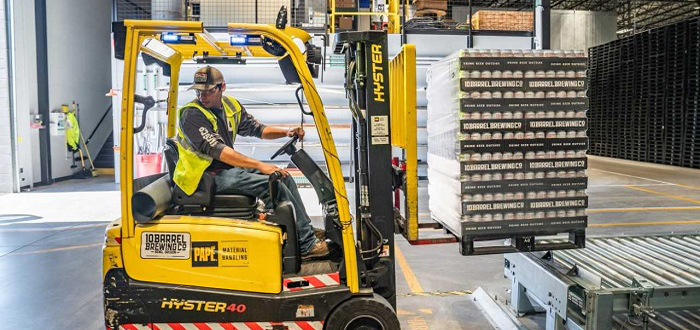-
ROSSLARE EUROPORT TARGETS HEALTH & SAFETY WITH CAMERA TELEMATICS PARTNERSHIP - 2 days ago
-
Landmark Study Reveals Wearable Robotics Significantly Boost Safety and Efficiency in Industrial Environments - July 24, 2024
-
Visku Tackle The Retail Seasonality Challenge One Pallet At A Time - July 22, 2024
-
KAMMAC AND BERGEN LOGISTICS STRENGTHEN FASHION & LIFESTYLE SERVICES IN THE UK - July 19, 2024
-
TENTBOX EXTENDS PARTNERSHIP WITH ARROWXL TO SUPPORT INCREASING DEMAND - July 17, 2024
-
The Perfume Shop improves customer journeys while driving profitability in partnership with Scurri - July 17, 2024
-
ZEROMISSION SECURES £2.3M ($3M) INVESTMENT TO ACCELERATE ELECTRIC FLEETS - July 16, 2024
-
BCMPA CELEBRATES SUCCESS OF 2024 CONFERENCE - July 15, 2024
-
Best of the Best: Jungheinrich Celebrates Triple International Award Win - July 12, 2024
-
GOPLASTICPALLETS.COM CALLS ON NEW CHANCELLOR RACHEL REEVES TO CONSIDER PLASTIC PACKAGING TAX REFORM - July 10, 2024
4 ways to improve the logistics of your e-commerce warehouse.
Being in the e-commerce industry can be both incredibly exciting and chaotic at times. But, with average weekly e-commerce sales earlier this year reaching just under £1.25 million, it’s clear that the market is excelling (Office of National Statistics). While this growth can mean many more companies are making a tidy profit at the end of the year, it also comes with the added pressure to ramp up the service and logistics of the processes to cope with this.
So, while you might already have some procedures in place, it may be time to think outside the box to cope with the rising demand. Here, we’ll be sharing our top four tips for improving the logistics of your e-commerce warehouse.
Optimise your workstations for efficiency
Before you can begin making plans to improve the logistics of your warehouse, you’ll need to assess the processes themselves to accurately identify where the issues lie and what should be optimised. To do this, you should take the time to monitor your staff — things such as how many times they touch the product, how long it takes them to do the tasks and if there is any travel involved will give you an indication of what needs adjusting for efficiency.
Common problems that disrupt the productivity of your workers could include clutter and disorganisation around the warehouse and important supplies and equipment being out of reach of workers. You can combat all of these by streamlining the process and providing them with specialised workstations to ensure they have all they need available to them. These tailored work spaces have the potential to raise your profits by increasing the throughput and reducing smaller tasks that can be done in less taxing ways.
Use virtual reality for problem-solving and training
While it might be possible to manually carry out an assessment of your warehouse for smaller companies, for larger corporations with many staff and busy production lines, this is typically not very practical. To combat this, using virtual warehouse management systems can help you to identify any issues within the warehouse without disrupting the workforce. This can include assisting you with finding the most efficient route for products to go through the warehouse, as well as giving managers a real time look at any site to ensure the processes are running as planned.
Some companies may prefer using augmented reality to make the order picking process faster and reduce errors — for example, providing employees with smart glasses that can show them where items can fit onto the carts and presenting them with the picking list on screen to streamline the process better.
Once you’ve identified the problems, you can then use this new software to train your staff on the new processes or layout of the workforce (and any hazards that may come with this) without having to recreate a potentially dangerous or chaotic scene in the warehouse.
Mechanise your processes
The goal of any e-commerce warehouse is to enable employees to improve their productivity and efficiency. But, with the need to factor in extra time for travelling across sites, and the time taken to transfer heavy goods, it’s possible that you will need to rethink your processes. This can include cutting down on the number of tasks done by manual labour and, instead, putting the responsibility on specialist lifting equipment to speed up the process. Doing this will allow your warehouse operatives to get through more work in a shorter amount of time, so the whole company can benefit from increased productivity.
Using mechanical aids such as hydraulic lifting equipment can not only assist with quicker production and picking times, but it can also make the warehouse processes safer by reducing the need for manual lifting. Penny Hydraulics specialise in this type of equipment to seamlessly mechanise your processes every step of the way. Their goods lifts in particular work to streamline the warehouse cycle and can reduce the time your workers would spend lifting heavy objects.
Maximise and organise your space
As your company grows, you’ll eventually need to expand your warehouse to cater for larger volumes of stock. However, if you’re not in the position to make the move to a bigger site just yet, it’ll be important to maximise the space you have available to you.
Using tall storage containers that can hold more stock will utilise any dead space and make the warehouse processes more efficient, particularly if you use mechanical aids for the picking process. You will also need to consider how you will stack these and how they can be selected when necessary. Brysdales have a selection of warehouse racking available, including drive-in and pallet racking, which can be tailored to fit with your warehouse. So, you’re sure to find the perfect storage solution without having to relocate.
To ensure you’re using the space to the best of your ability, you should also take the time to analyse how popular each item of stock is and position this in an appropriate place. For example, by placing your most in-demand products at the lower levels where staff can reach them and the less popular ones at the top where they can be picked by lifts.
Improving the logistics of your warehouse can seem daunting, but with our top four tips and some forward-planning, you’ll be well on your way to making your picking and packing processes more efficient.

































